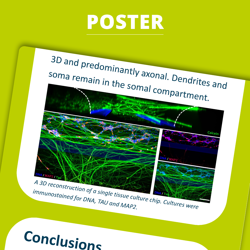 Amyotrophic lateral sclerosis (ALS) is a neurodegenerative disease in which upper and lower motor neurons undergo progressive degeneration leading to muscle denervation, paralysis, and death within 3–5 years after diagnosis. The exact causes remain unknown, but aberrances in axonal stability, axonal transport, and axon growth dynamics have been reported amongst other hallmarks. Although traditional 2D cultures and in vitro platforms have shown to be invaluable for studying neurite outgrowth and regeneration, they lack in uncovering ALS disease mechanisms and do not allow for directed neurite outgrowth and separation of cell somata and neurites, which is of major interest in studying motor axon biology. Microfluidic systems can be the solution as they provide excellent spatial control of cells and matrices, and are routinely used to study axon outgrowth.
Amyotrophic lateral sclerosis (ALS) is a neurodegenerative disease in which upper and lower motor neurons undergo progressive degeneration leading to muscle denervation, paralysis, and death within 3–5 years after diagnosis. The exact causes remain unknown, but aberrances in axonal stability, axonal transport, and axon growth dynamics have been reported amongst other hallmarks. Although traditional 2D cultures and in vitro platforms have shown to be invaluable for studying neurite outgrowth and regeneration, they lack in uncovering ALS disease mechanisms and do not allow for directed neurite outgrowth and separation of cell somata and neurites, which is of major interest in studying motor axon biology. Microfluidic systems can be the solution as they provide excellent spatial control of cells and matrices, and are routinely used to study axon outgrowth.
In this poster, we present a 3D neurite outgrowth model using iPSC-derived motor neurons and demonstrate that this model is suitable for studying nerve damage that is compound-induced or resulting from disease. Here, we highlight that the OrganoPlate® platform is ideal to study toxic effects on periperal neurons and captures ALS-relevant processes, and that it is functional for studying axonal biology and disease and subsequent therapy development.
Download the poster here
